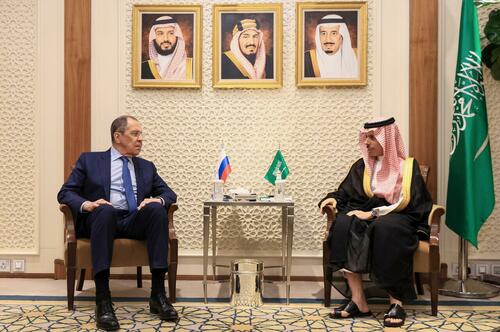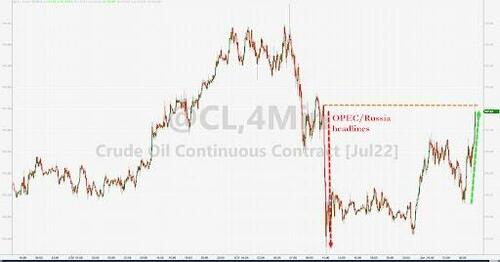No, OPEC+ Isn’t About To Break Up And No, Saudis Aren’t About To Pump More Crude
Yesterday oil tumbled because, as Bloomberg put it, among the many reverberations from Russia’s invasion of Ukraine another might be an early end to OPEC+’s oil supply pact. The 23-nation alliance, led by Saudi Arabia and Russia, is due to finish restoring production halted during the pandemic by the end of September, but the Wall Street Journal reported – in a report that has not been confirmed anywhere else – that OPEC is contemplating suspending Russia from the coalition’s quota system, as sanctions prevent Moscow from increasing output. The Saudis and the United Arab Emirates might fill the resulting supply gap, the WSJ said, potentially setting in motion a breakdown of the alliance.
And even though oil prices slumped following the report, ignoring Europe’s all too real (if rather delayed) embargo on Russian oil and focusing on hope that we may get a few hundred thousand extra barrels of Saudi oil supply, none of what the WSJ reported is going to happen, and as Bloomberg’s Grant Smith writes this morning, when OPEC+ gathers tomorrow, the agenda will more likely be business as usual.
For those who missed it, the WSJ reported that Saudi Arabia and the UAE could fill Russia’s unused quotas, helping to tame inflation and earning President Biden’s appreciation in the process.
Well, don’t hold your breath: as Smith correctly notes, such a move would be a grave step, rupturing ties between the Gulf nations and the Kremlin and risking the disintegration of the whole OPEC+ network. Delegates across the group don’t consider that imminent… or even realistic.
Yes, there are some – such as RBC’s Helima Croft – who point out that the Biden administration has been intensifying its diplomatic push to get Riyadh to open the taps, and one option we could see in coming weeks or months is that the kingdom speeds up the return of barrels still offline since the pandemic. But even if such an improbable deal is struck — and there’s no guarantee it will be, after all the last time Biden called the Saudis, nobody picked up the phone — it’s too far off to affect deliberations when the OPEC and its partners meet tomorrow. As a result, they’re likely to stick with the script and rubber-stamp another modest supply increase for July.
Meanwhile, cementing ties between Moscow and Riyadh, on Wednesday, Russia said Saudi Arabia hailed their oil-market cooperation in the OPEC+ alliance as Foreign Minister Sergei Lavrov visited the kingdom for talks with Gulf officials.
The trip comes as Moscow faces growing pressure from the US and its allies over its invasion of Ukraine. Yet despite western pressure, oil-exporting Gulf nations have maintained close ties with Moscow and have ignored sanctions imposed by the US and its allies.
Lavrov and his Saudi counterpart, Prince Faisal bin Farhan, “praised the level of cooperation in the OPEC+ format,” the Foreign Ministry in Moscow said in a statement. “They noted the stabilizing effect that tight coordination between Russia and Saudi Arabia in this strategically important area has on the global hydrocarbon market.”
Which is not to say that Saudi Arabia will never try to take advantage of the situation – after all, OPEC+ did collapse (briefly) in March 2020. Still, as Bloomberg’s Paul Wallace writes, there are plenty of hurdles to overcome before Riyadh and allies such as Abu Dhabi would be willing to isolate Russia by accelerating their oil output increases or pumping above their OPEC+ quotas.
Most are political in nature. Saudi Arabia and the UAE want greater security commitments from the US, especially to allay fears about Iran and its proxy groups in the Middle East. Saudi Arabia’s Crown Prince Mohammed bin Salman also wants President Joe Biden to treat him as the kingdom’s de facto leader that he is, which however does not look realistic with all the residual bad blood – no pun intended – over the Jamal Khashoggi murder..
The US has made overtures to the Saudis and Emiratis in recent months in a bid to improve its strained relations with them. But so far they have stuck to their slow crude-production increases and insisted Russia’s inclusion in OPEC+ is vital for their interests. Still, if Biden’s mooted trip to Saudi Arabia goes ahead –it’d be the first of his presidency — it may pave the way for a deal. For now, however, the only direction oil will trade in the coming weeks and months, is up.
Tyler Durden
Wed, 06/01/2022 – 09:32
Zero Hedge’s mission is to widen the scope of financial, economic and political information available to the professional investing public, to skeptically examine and, where necessary, attack the flaccid institution that financial journalism has become, to liberate oppressed knowledge, to provide analysis uninhibited by political constraint and to facilitate information’s unending quest for freedom. Visit https://www.zerohedge.com

